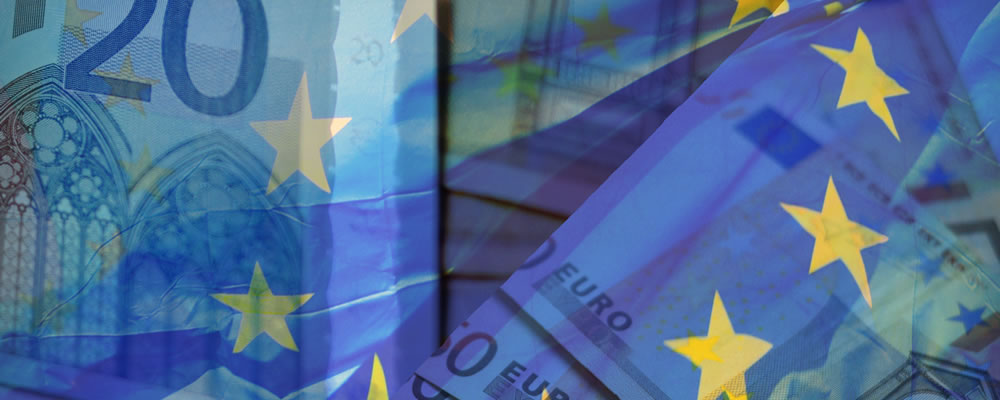The approach of key Eurozone data has prevented poor post-Brexit consumer credit figures from overly weakening the Pound Euro exchange rate so far.
- UPDATE: Eurozone manufacturing weakens – Sector data does nothing to allay ECB stimulus bets
- UPDATE: German CPI data disappoints – Inflation stagnant on the month in August
- GBP EUR weakens on EU minister comments – Sigmar Gabriel warns against letting UK keep single market benefits
- Consumer credit demand slips following Brexit – Mortgage demand also weaker
- Eurozone confidence figures worsen – Confidence figures weigh on growth outlook
- GBP EUR exchange rate forecast – German inflation on tap
Warnings over the outcome of the UK’s Brexit negotiations have softened the Pound Euro exchange rate today.
Pound Goes Bullish against Euro as US Data Disappoints
Significantly below-forecast US payrolls figures and a surprisingly static unemployment rate have weakened the Euro, finally breaking the deadlock which saw the Pound stuck with gains of around 0.1%. The NFP was expected to show job creation of 180k after last month’s 255k surge, but instead showed the creation of 151k jobs. The data has lowered the odds of a rate hike in 2016 from the Federal Reserve, which is disadvantageous for the Euro; tighter policy would have pushed the common currency lower, aiding the European Central Bank (ECB) in its efforts to stimulate inflation.
(Last updated 16.14, 02/09/2016)
GBP EUR Holds Gains but Fails to Advance after Strong UK Construction Sector Rebound
The UK construction PMI for August may have smashed forecasts, but the GBP EUR exchange rate has been unable to further the 0.1% gains made at the start of trading. The index, which had slumped to 45.9 in the wake of the vote for Brexit, recovered to 49.2, eclipsing forecasts for a score of 46.5. The below-50 score indicates that this is the third consecutive month the industry has remained in contraction, however.
(Last updated 10.17, 02/09/2016)
Euro Decline Extends as Markit Manufacturing PMIs Undershoot Forecasts; UK Manufacturing Bullish
The latest run of Eurozone manufacturing PMIs has added to Euro headwinds today after the results largely disappointed forecasts. The Italian index dropped into contraction territory, the French index moved further into decline than forecast and the German and Eurozone indices saw above-forecast slowdowns. Only the Greek PMI surprised to the upside, rising from 48.7 to 50.4, against expectations of a slip to 48.4.
Meanwhile, the UK PMI has posted a strong rebound, drastically overshooting forecasts of a recovery to 49 to land firmly in growth territory at 53.3. In fact, the reading is the strongest in ten months.
The EUR GBP exchange rate is currently trading down -0.85% around 0.8422.
(Last updated 12.29, 01/09/2016)
UK Consumer Confidence Recovers above Forecast; Pound Advances
Consumer sentiment in the UK recovered above expectations in August, boosting the Pound despite remaining firmly in negative territory. A rise to -8 from -12 was forecast, but instead the GfK index climbed to -7.
Elsewhere, the Lloyds Business Barometer slumped, falling from 29 points to 16, but GBP EUR exchange rates are up 0.2% at 1.1762.
House prices have also seen a strong increase, defying forecasts from economists to slow on the year and contract on the month. Prices rose 5.6% on the year and 0.6% on the month, dashing expectations of 4.8% and -0.2% respectively.
(Last updated 16.50, 31/08/16)
German Consumer Price Data Weakens Euro after Showing Stagnant Inflation in Eurozone Powerhouse
Preliminary German inflation estimates for August have undermined the Euro today after disappointing forecasts. On the month price growth was meant to slow from 0.3% to 0.1% but instead prices stagnated. On the year the pace of inflation held steady at 0.4% instead of ticking higher to 0.5% as forecast. This could increase the likelihood that the European Central Bank (ECB) has to deliver more stimulus measures in the near-term, although today’s data comes after the cut-off period for the next monetary policy meeting so will not impact the decisions made on the 8th of September.
(Last updated 16.20, 30/08/2016)
GBP EUR Weakens as German Minister Warns against Brexit Concessions for UK
The Pound has weakened from opening levels thanks to comments from German Economy Minister Sigmar Gabriel today. Speaking at a news conference yesterday Gabriel has stated that Britain should not be allowed to keep the perks of being a member of the European Union without being a fully paid-up member. This has once again pushed the thorny issue of Brexit negotiations into the spotlight, weakening market appetite for the Pound.
Many Brexit supporters are of the opinion that the UK will be able to negotiate single market access without having to accept free movement in return; something no other single market participant has ever been able to achieve. However, ‘Remainers’ claim that the EU has no incentive to allow this to happen. Many Eurozone ministers and commentators have already suggested that to give the UK any concessions would risk angering other external single market participants and undermine the Union’s ability to enforce its authority among its member states.
Gabriel warned that;
‘If we organise Brexit in the wrong way, then we’ll be in deep trouble, so now we need to make sure that we don’t allow Britain to keep the nice things, so to speak, related to Europe while taking no responsibility.’
While the triggering of Article 50 and therefore the beginning of the formal exit process from the European Union is the biggest uncertainty facing the markets at the present, the type of relationship the UK will have with the EU post-Brexit remains a major concern.
Also weakening the Pound is data suggesting that commentators may have spoken too soon when they claimed that the UK consumer had ‘shrugged off’ the shock of the UK’s Brexit vote. Consumer credit figures have fallen significantly below forecast, dropping from £1.85 billion in June to £1.18 billion in July, representing the weakest uptick in credit since August last year. This took the rate of credit growth down from 10.3% to 10.1%, which is the first time the growth rate has slowed since the end of 2014.
Mortgage approvals figures were also worse than predicted, clocking in at 60.9k instead of from 64.1k to 61.9k. The total figure for net lending secured on dwellings weakened from a downwardly-revised 3.2 billion to 2.7 billion.
Euro Softened ahead of German CPI Figures by Weakening Eurozone Confidence Data

While soft overall the Euro is making minor gains verses the Pound today in spite of largely weaker-than-expected confidence figures from across the Eurozone and the approach of key CPI data from Germany.
While Greek business and consumer confidence rose and Spanish inflation climbed out of negative territory on the month and saw a slowing decline on the year, the rest of the day’s data thus far has disappointed forecasts.
Eurozone economic sentiment fell from 104.5 to 103.5, business confidence edged lower, barely above pessimistic territory, industrial sentiment became markedly more negative and services sentiment ticked lower as well. Forecasts for the data had variously predicted either no changes or a much smaller weakening in outlook than was revealed.
Capital Economics’ European Economist Jack Allen commented;
‘August’s fall in the Eurozone economic sentiment indicator supports our long-held view that growth in the currency union will slow in the second half of this year. The sectoral breakdown confirmed the fall in consumer confidence and revealed declines in the services, retail and industrial indices. … the general weakness of ESIs across the Eurozone suggests that more fundamental forces are weighing on growth, such as the fading boost from previous declines in oil prices and the Euro exchange rate.’
Pound Euro (GBP EUR) Exchange Rate Forecast; Will German Inflation Data Alter ECB Outlook?
GBP EUR exchange rates could continue to decline for the rest of the session if today’s German consumer price index figures come in on-forecast. Preliminary readings are expected to show a monthly slowing in price growth and a ten basis point uptick on the year. Should the figures disappoint, however, the Euro could reverse gains on the increased likelihood that the European Central Bank (ECB) will have to further increase its economic stimulus measures.
The Pound could receive a boost this afternoon from the results of the Bank of England’s (BoE) latest bond-buying operation. Recently, the BoE has been able to purchase enough bonds in its reverse auctions to meet the requirements of its quantitative easing programme. Another successful operation would further help lay fears that QE will fail to rest after one of the first instances of bond-buying came up short by -£50 million.
Current GBP, EUR Conversion Rates
The Pound Euro (GBP EUR) exchange rate is currently trading in the region of 1.1710, while the Euro Pound (EUR GBP) exchange rate is trending in the region of 0.8539.



